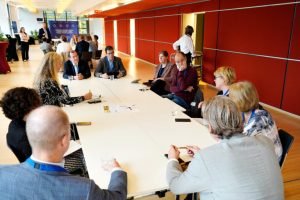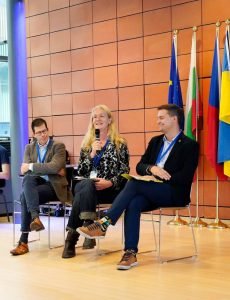
Under the flag of the SHERPA project, the P10, the association for rural municipalities in the Netherlands hosted the participatory lab as part of the main programme of the European Week of Regions and Cities in Brussels. A diversity of experiences in the SHERPA project kick-started the discussion.
Pawel Chmieliński, President to the European Rural Development Network in Poland highlighted how leveraging the potential of rural areas is about connecting policy to the reality of people and making rural voices heard in order to effectively link local problems to solutions in EU policies. Rural interfaces have a strong potential to contribute to cohesion and community building and to make sure that nobody is left behind. At the same time, they foster a sense of empowerment, raise awareness of the EU and enhance the European identity of local communities. Jorieke Potters, action researcher at Wageningen Research stressed the potential of Rural Science Society Policy Interfaces for engaging rural actors in shaping the future of Europe. The SHERPA experience shows how engaging rural areas in policy involves a delicate process of continuous translation and trust building between different actor groups and levels of governance.
CONNECTING EU FRAMEWORKS WITH RURAL REALITIES
Rural interfaces as spaces for policy dialogue, connectivity, democratic capacity building and rural development can be supported by increasing transparency in the policy agenda and sending out a clear invitation. Furthermore, it is required to operationalise a strong commitment and allocate resources to the facilitation of rural interfaces and dialogue. Joost van Oostrum, mayor of the Municipality of Berkelland, in Eastern Netherlands shared his rich experiences of how capable rural areas are to drive their own development.
When bringing rural actors together to take action for regional climate adaptation, he saw how rural actors know what they need and how they can organize that, within their specific strengths and weaknesses. What they need from EU policy is basically trust, space and support. Starting from the SHERPA insights participants were invited to share their perspectives and discuss ideas to support the emancipation of rural areas, below are the resulting actions:
- Creating Inclusive Spaces: Establishing spaces and mechanisms that facilitate collective growth and engagement among rural actor groups and within communities.
- Capacity Building: Equipping decision-makers with the tools and knowledge necessary to allow participation and engage effectively with rural actors.
- Participatory Budgeting: Promoting a transparent process for allocating financial resources, giving communities a direct say in how budgets are directed.
- Trusted Intermediaries: Countering discontent by enabling intermediaries trusted by all levels of government to bridge gaps and facilitate communication.
- Flexibility in Projects: Allowing for adaptability in project design and implementation to meet the unique needs of rural areas.
- Rural Proofing: Bringing to the forefront the unique challenges and opportunities of rural areas in policy discussions, and ensure that EU policies are designed to address rural concerns effectively.
- Urban-Rural Connectivity: Enhancing links between cities and rural areas for mutual benefit.
- Improving Rural Infrastructure: Focusing on accessibility through transportation, housing, and a modern job market, along with digital infrastructure.
- Recognizing Farmers: Acknowledging and appreciating the pivotal role of farmers in rural development.
- Investing in Local Identity: Fostering connections to local culture and heritage to instill pride in rural communities, create the conditions for joint activities between generations, building a sense of community and embeddedness, in particular in young people and rural newcomers.
Combining these actions with the lessons learned in the SHERPA Science Society Policy interfaces, along with the recommendations for policy and research provide key factors in making the ambitious aspirations of the Long Term Vision for rural areas a reality. Weaving stronger, connected, resilient, and prosperous rural areas into the tapestry of European society.

